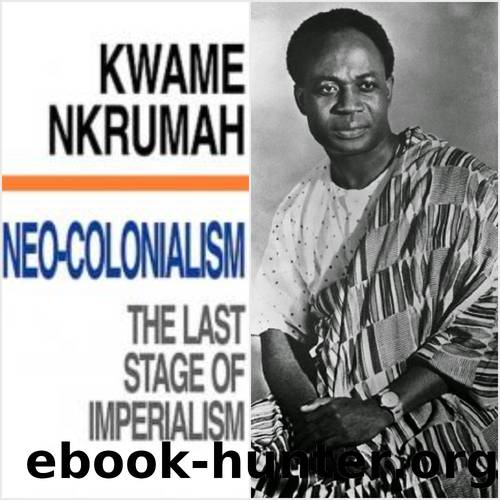Neo-Colonialism, The Last Stage of Imperialism by Kwame Nkrumah

Author:Kwame Nkrumah
Language: eng
Format: epub
Published: 2020-09-06T16:00:00+00:00
8. Foreign investment in south African mining
It has been estimated that over 50 per cent of the foreign capital invested in Africa has been poured into South Africa. British investments probably total nearly $2,800 million, and American investments closer to $840 million. A 1957 U.S. government survey of American overseas investments shows the single most profitable area was in the mining and smelting business of South Africa, whose profits are higher than from any comparable investment in the United States. The high profits can be explained largely by the cheapness of African labor. According to the 1962 Statistical Abstract of the United States, U.S. miners earn an average of $2.70 an hour, which is twenty-seven times the amount earned by South African miners.
Dominant in South Africa's economy is the Anglo-American De Beers group, part of the empire of Harry Oppenheimer, which extends into South West Africa and Zambia, and is linked with mining companies in many other African states. The value of the empire has been enhanced by the discovery that uranium can be produced from the residues and slimes which surround old gold mines.
Extraction of uranium from gold ores and slimes has brought South Africa into the world's leading place as a producer of uranium. The working of slimes accumulated over the past sixty years, together with those from current gold production, is helping to prolong the life of many exhausted gold mines. In 1956, 8,000,000 lb. of uranium oxide were produced in South Africa, providing exports valued at £39 million. This leaves out of account the quantities that go to the Atomic Energy Board of South Africa, with whom several of the mines have contracts. The profit made from the production of uranium oxide is running ahead of that derived from gold extraction. In fact, 'the working profits derived from uranium extraction exceeded those derived from gold extraction on the seventeen producing mines taken together, and on five of them they actually offset working losses incurred in the production of the gold'.*
Harmony Gold Mining Co. Ltd. is one of the more important gold and uranium producing companies within the Anglo American Consolidated Gold Fields' maze of interests. Its authorized capital of £5 million has been paid up to the amount of £4,500,000. Secretarial services and offices to the company are provided by Rand Mines Ltd., a company that gives executive, administrative and technical services to the South African companies of the Central MiningâRand Mines group.
Chairman of Harmony is P.H. Anderson, a deputy chairman of Rand Mines. Other directors in common are Messrs. R. E. M. Blakeway and N. W. S. Lewin. Chairman of Rand Mines is C. W. Engelhard, who is also chairman of Rand American Investments (Pty) Ltd., and patently has a watching brief for the United States investors who more and more are infiltrating into primary materials extraction in Africa. All of Rand American's 2,371,049 issued shares of £1 each are held by De Beers Investment Trust Ltd. (now Randsel), a wholly owned subsidiary of Rand Selection Corporation since the recent re-juggling of the Rand group.
Download
This site does not store any files on its server. We only index and link to content provided by other sites. Please contact the content providers to delete copyright contents if any and email us, we'll remove relevant links or contents immediately.
International Integration of the Brazilian Economy by Elias C. Grivoyannis(57292)
The Radium Girls by Kate Moore(10903)
Turbulence by E. J. Noyes(7033)
Nudge - Improving Decisions about Health, Wealth, and Happiness by Thaler Sunstein(6629)
The Black Swan by Nassim Nicholas Taleb(6184)
Pioneering Portfolio Management by David F. Swensen(5599)
Rich Dad Poor Dad by Robert T. Kiyosaki(5140)
Zero to One by Peter Thiel(4818)
Man-made Catastrophes and Risk Information Concealment by Dmitry Chernov & Didier Sornette(4730)
Secrecy World by Jake Bernstein(3774)
Millionaire: The Philanderer, Gambler, and Duelist Who Invented Modern Finance by Janet Gleeson(3566)
Skin in the Game by Nassim Nicholas Taleb(3456)
The Age of Surveillance Capitalism by Shoshana Zuboff(3413)
The Money Culture by Michael Lewis(3277)
Skin in the Game: Hidden Asymmetries in Daily Life by Nassim Nicholas Taleb(3259)
Bullshit Jobs by David Graeber(3173)
The Dhandho Investor by Mohnish Pabrai(3162)
The Wisdom of Finance by Mihir Desai(3069)
Blockchain Basics by Daniel Drescher(2884)
